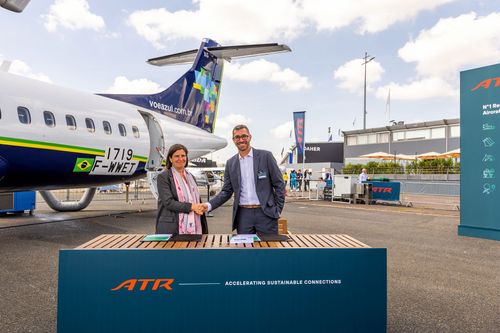ATR signs MOU with ATOBA Energy to Improve SAF access for regional airlines

At the 2025 Paris Airshow, ATR signed an MoU with ATOBA Energy to improve SAF access for regional airlines. / SOURCE: ATOBA Energy
July 2, 2025
BY ATOBA Energy
At the 2025 Paris Airshow, ATR and French SAF aggregator ATOBA Energy signed a memorandum of understanding (MOU) to explore ways to facilitate and accelerate sustainable aviation fuel (SAF) adoption for ATR operators. This strategic partnership reinforces ATR’s commitment to helping its operators benefit from lower-emission flights, especially those without direct SAF supply options.
Through this agreement, the two companies will explore:
Advertisement
- physical delivery solutions to streamline SAF access for regional airlines;
- technical and regulatory support to help airlines seamlessly integrate SAF in their operations
- The mass balance model, aligned with the Greenhouse Gas Protocol, enabling airlines to benefit from SAF’s environmental advantages without requiring direct physical access to the fuel.
“Sustainable Aviation Fuel is one of the most effective tools we have to reduce carbon emissions in the near and medium term, and it plays a central role in ATR’s long-term environmental strategy,” said Nathalie Tarnaud Laude, CEO of ATR. “However, access to SAF remains a real challenge for many regional airlines, particularly those serving remote or underserved areas. This MoU is a decisive step toward removing those obstacles. By working with ATOBA Energy, we are not just promoting SAF — we are looking at making it a viable, scalable solution for operators across our entire global network.”
A key partner in this effort, French start-up ATOBA Energy brings deep expertise in sustainable fuel purchasing solutions and a strong commitment to accelerating the transition to low-carbon aviation. Together, ATR and ATOBA Energy will explore innovative business and operational models to make SAF access simpler and more reliable for regional operators. This collaboration aims to make it easier and more efficient for airlines to purchase SAF, by creating straightforward and reliable processes that are easy to use and safe to implement. At the same time, it will equip airlines with accurate, lifecycle-based carbon data aligned with the Greenhouse Gas Protocol. By doing so, the initiative supports greater transparency and accountability in sustainability reporting across the sector.
Advertisement
“We’re proud to partner with ATR to make sustainable aviation a reality for all operators, regardless of geography,” said Arnaud Namer, CEO of ATOBA Energy. “Our partnership will be a powerful enabler for scaling SAF use across the industry. Part of it relies on our “Book and Claim and Mass Balancing" model, that allows airlines to benefit from the environmental impact of SAF even if they don’t have physical access to the fuel — which is especially critical for remote or underserved regions. Working with ATR, we’re creating practical, inclusive pathways toward meaningful emissions reduction in regional aviation.”
ATR’s SAF strategy is part of a broader, long-term commitment to environmental leadership. The company is working toward achieving 100% SAF capability for its aircraft by 2030, in line with its ambition to make sustainable regional aviation a reality. This effort supports the wider goals set by the international community during the CAAF/3 conference and is reinforced by ATR’s active collaboration with national and regional authorities.
Related Stories
U.S. fuel ethanol capacity fell slightly in April, while biodiesel and renewable diesel capacity held steady, according to data released by the U.S. EIA on June 30. Feedstock consumption was down when compared to the previous month.
XCF Global Inc. on July 8 provided a production update on its flagship New Rise Reno facility, underscoring that the plant has successfully produced SAF, renewable diesel, and renewable naphtha during its initial ramp-up.
The USDA’s Risk Management Agency is implementing multiple changes to the Camelina pilot insurance program for the 2026 and succeeding crop years. The changes will expand coverage options and provide greater flexibility for producers.
EcoCeres Inc. has signed a multi-year agreement to supply British Airways with sustainable aviation fuel (SAF). The fuel will be produced from 100% waste-based biomass feedstock, such as used cooking oil (UCO).
President Trump on July 4 signed the “One Big Beautiful Bill Act.” The legislation extends and updates the 45Z credit and revives a tax credit benefiting small biodiesel producers but repeals several other bioenergy-related tax incentives.
Upcoming Events










